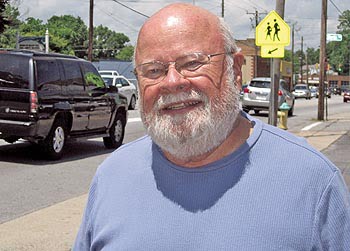Tom Muncy

By Moe White
Growing up near Elizabeth City, NC, Tom Muncy graduated with a high school class of 25 students. Sixteen of those 25 went on to technical schools, community colleges, or universities: education was valued highly by the rural farming families of Sunbury.
Today Tom is a business broker, commercial realtor, and owner of Working Capital Brokerage, which he founded in 2011 to help small business owners find financial support that is unavailable through banks. The business helps entrepreneurs who want to find buyers—or helps buyers looking for a business investment (though of course he represents only one side of any particular deal).
WCB also helps businesses that need financing to grow. Since the 2008 financial meltdown, FDIC regulations have nearly eliminated eligibility for loans that rely on real estate for collateral. Thus small businesses whose building or property is a substantial part of their investment often can’t get bank loans.
That’s where Tom steps in: he connects private equity groups and private capital banks with business owners. He can, for example, fit the need for financing by a business in North Carolina or Florida with a finance group in Minnesota or New York.
“My goal is to create jobs by helping small businesses grow and expand,” he says. “The impact of losing a job when a small business closes altogether can be much worse than facing layoffs from a bigger company.”
Tom went to UNC-Chapel Hill to study banking. His father, a rural mail carrier, was on the board of the Farmers Bank of Sunbury and wanted a stable bank job for his son, but Tom discovered that he was more interested in labor issues. So he switched majors and earned his degree in Industrial Relations.
His favorite college class had eighteen students in it. “We were split into nine ‘union guys’ and nine ‘employers.’ We visited Karastan Mills, and the union team met with the plant’s union foreman, while the others met with management. We then spent the rest of the semester negotiating a contract!”
Tom graduated in January 1966, was drafted into the Army, and after a yearlong tour in Vietnam he served the rest of his time at Fort Lewis, Washington.
He moved to Asheville in 1969. When Board Vice-chairman Harry Clark, of St. Joseph’s Hospital, learned about Tom’s degree, he persuaded their Board to hire him “to keep the unions out.” And Tom understood the way to do that: “offer competitive wages and benefits; lower your unemployment tax rate by having good, clear rules for employees”; and ensure that employees are fairly treated and rewarded.
Tom went next to Highland Psychiatric Hospital, and then Buncombe County hired him as Personnel Director—specifically to take politics out of personnel decisions at a time when county jobs were political plums for friends and family. He got the job, in part, because he was active in the Jaycees and he helped a fellow club member win a commission seat.
Over the next two-and-a-half years, he cleaned up the courthouse, both figuratively—by establishing civil service-type hiring policies, developing job descriptions and requirements, and establishing well-qualified department heads—and literally—by reorganizing schedules, for example, so that cleaning crews worked off-shifts instead of trying to clean floors while daytime staff were walking on them.
But politics still reared its head; when he refused to hire an unqualified person as demanded by the commissioner he had originally helped elect, that commissioner and two others voted to fire him.
Immediately offered a position at Thoms Rehabilitation Hospital (now CarePartners), Tom soon began raising funds for the United Way, and he learned how much he enjoyed sales. Five years later, he put his skills to work with Iwanna, then Dial-A-Page, and then a service dedicated to expanding employees’ access to health benefits. After that, starting his own business was a natural step.
Today Tom is active member with Rotary, which gives back to the community through scholarships and service projects, including support for MANNA Food Bank and hands-on help with the Emma Resource Center, which serves one of the lowest-income communities in Asheville.
He’s also an associate member of the Coalition of Independent Business Owners and a board member of the United Services Credit Union, which offers the entire community savings, loans, and other programs. And he’s active in Central United Methodist Church.
Tomn attributes much of his success to his mentor and wife, Libby Flowers, a Critical Care nurse, to whom he has been married for 29 years. They have three grown children and seven grandchildren.
Having already earned an insurance license, Tom acquired his real estate license in 2001, and he was trained and certified by the elite International Business Brokers Association; throughout his life, he has continued to educate himself to accomplish his goals.
A visiting lecturer for numerous college-level entrepreneur classes, he speaks eloquently of the need for an education for any young person who wants to succeed. “Joe Fox’s entrepreneurs’ program at AB Tech is a great place for young people who want to succeed. When I speak to his class, I ask students, ‘Is it better to start from the ground up building a business, or to save money and buy an existing one?’ There’s no correct answer: there’s just pros and cons for each option.
“What matters most is to stay in school and get an education, and then keep learning. You can invent a new product, or you can get a job to learn management skills from the people you work with. And one day, when you know you can run the company better than they can, that’s when to go out and start a business of your own.”






